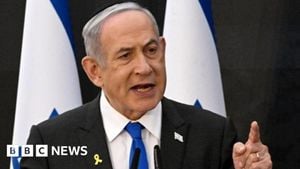Millions of people are casting their votes today in state elections across two pivotal Indian states: Maharashtra, located on the western coast, and Jharkhand, rich with minerals from the east. These elections serve as a significant barometer for Prime Minister Narendra Modi's popularity and for his Bharatiya Janata Party (BJP), which seeks to strengthen its foothold amid increasing political challenges.
Maharashtra, often dubbed India's industrial powerhouse and home to its financial nucleus, Mumbai, is currently ruled by Modi's BJP alongside its Hindu nationalist allies. Conversely, the eastern state of Jharkhand is administered by the Congress party-led alliance. With the BJP needing to demonstrate its strength here, recent election rallies by Modi aim to rally support from the electorate.
Modi's appeal has focused particularly on the youth and women, reflecting his recognition of their electoral weight. Just prior to the polls, he emphasized this on X (formerly Twitter), urging these demographics to participate actively: "On this occasion, I appeal to all the youth and women voters to vote in large numbers." This entreaty is not only about turnout but also signifies the BJP's strategy to connect with segments of the population feeling vulnerable amid recent socio-economic challenges.
The stakes are high for Modi as he navigates the fallout from recent national elections where his party lost the overall majority. Political analysts, like Nilanjan Mukhopadhyay—who authored Modi's biography—suggested the outcome of these state elections could sway public perception of his leadership. Mukhopadhyay pointed out, "A reversal here would negatively impact Modi’s leadership style and could have repercussions for the BJP's upcoming challenges, particularly in Delhi and Bihar next year."
Votes are being cast amid deep-rooted sentiments. The BJP, leveraging aggressive campaigning rhetoric, aims to sway Hindu voters with emotionally charged slogans like “If you divide, then you will die,” which has drawn criticism for allegedly polarizing voters along religious lines. This charge is particularly relevant in Maharashtra, where Hindus make up nearly 80% of the population compared to about 11.5% Muslims.
Polling data leading up to the elections suggests the opposition alliance—comprising the Congress party and coalition partners such as Shiv Sena and Nationalist Congress Party—is currently favored to prevail. These parties are hoping to capitalize on dissatisfaction stemming from high youth unemployment rates and growing inflation, which many blame on the BJP's governance. This is especially poignant as high crop prices and economic duress have shown to erode support for Modi's administration. The Congress party recently made significant gains, showcasing its resilience as it claimed 30 out of 48 seats during the national elections.
The BJP is also gambling on welfare schemes as part of its electoral strategy, particularly aimed at women voters. They introduced schemes promising 1,500 rupees (about $18) monthly to women from families with lower incomes. Meanwhile, if the Congress party manages to retake power, they have pledged to surpass this by doubling the monthly aid and offering free public transportation for women.
But it’s not solely the policies at stake; it’s also the political narrative. After the BJP's recent recovery highlighted by victories in Haryana where they originally faced immense challenges, the party appears intent on regaining lost ground. Local sentiment, characterized by dissatisfaction with the Congress-led government, could align favorably if the BJP successfully frames this election as one of choice and opportunity.
Electoral strategies are under scrutiny as the votes are counted Saturday following today's polling. Analysts will be watching closely to gauge the impact of Modi's coalition and determine its future both nationally and within Maharashtra and Jharkhand. The outcome could reshape political landscapes just as these states, rich with resources and population, hold significant sway over India's broader political narratives.
Across polling booths, the anticipation is palpable, and as citizens line up to cast their votes, the prospects of change hang in the balance. Voter turnout and engagement will be telling indicators of Modi's continuing grip on power and whether his party can deftly navigate through the tumultuous waters of Indian political dynamics.
The recent elections are not just about party politics; they signify the democratic pulse of India. For many voters, it is more than mere politics—it is about the future, hope, and the ideas of who they envision leading their states and, by extension, their nation. The next few days will define the future of Modi and his party against the backdrop of fervent Indian democracy.



